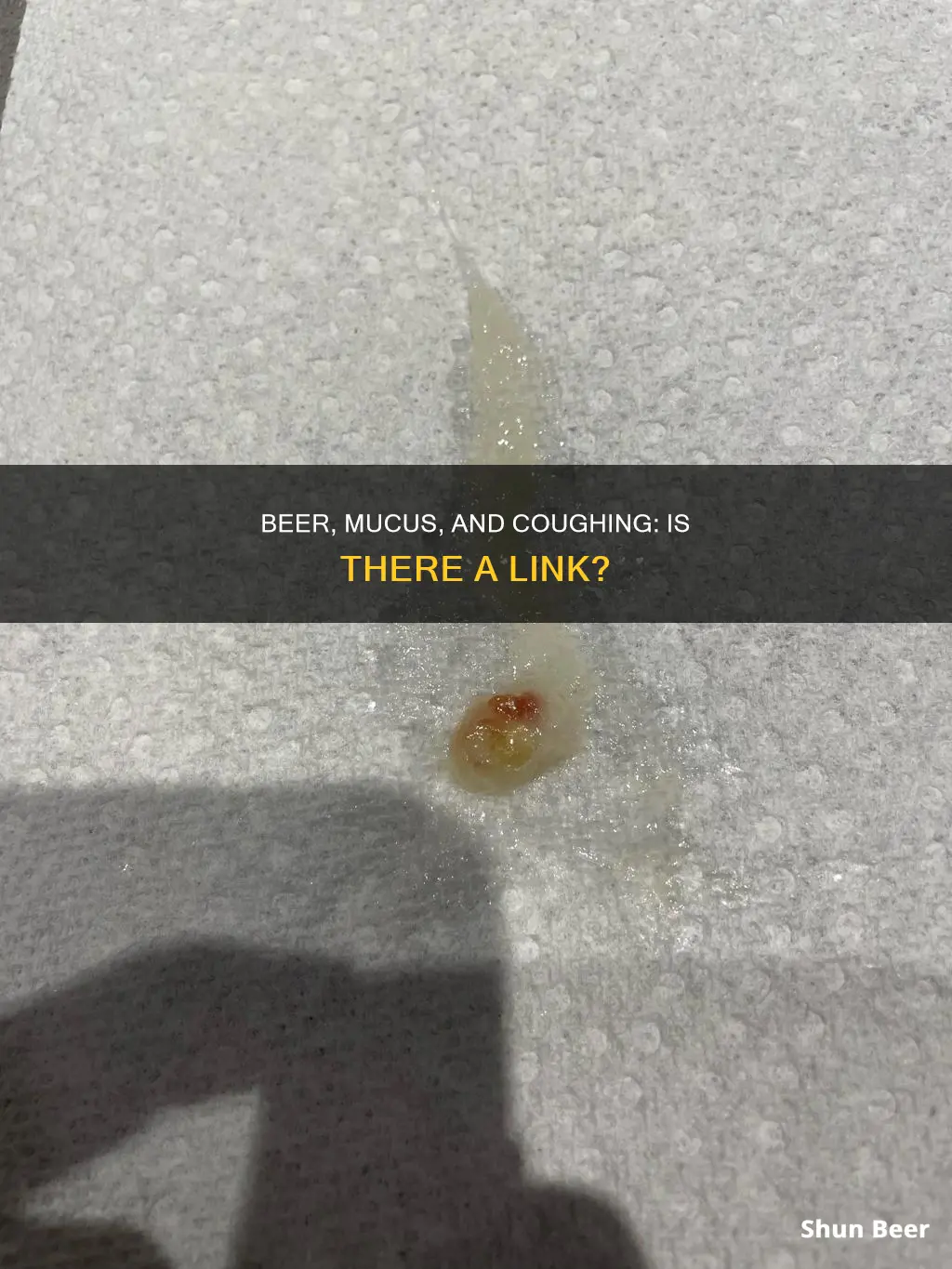
Alcohol can have a range of effects on the lungs, both short-term and long-term. Excessive alcohol consumption can cause mucus production and coughing. Alcohol can irritate the throat and airways, leading to a coughing reflex. It can also increase mucus production in the airways, which the body tries to clear through coughing. Additionally, heavy drinking can impair the function of cilia, tiny hair-like structures that line the airways and help move mucus and other debris out of the lungs. This can lead to a buildup of mucus and an increased risk of respiratory infections and other lung problems. Furthermore, alcohol has a dehydrating effect on the body, which can thicken airway mucus.
| Characteristics | Values |
|---|---|
| Effect of excessive drinking on mucus production | Excessive mucus production |
| Alcohol-induced ciliary dysfunction | Impaired function of cilia, tiny hair-like structures that line the airways and help move mucus and other debris out of the lungs |
| Effect of alcohol on the body | Dehydration |
| Effect of alcohol on the immune system | Weakened immune system |
| Effect of alcohol on the lungs | Lung damage, inflammation, lung diseases and infections, coughing, choking, aspiration pneumonia, lung injury, acute respiratory distress syndrome, asthma |
What You'll Learn
- Alcohol can cause irritation in the throat and airways, triggering a coughing reflex
- Alcohol can increase mucus production in the airways, leading to coughing as the body tries to clear the excess mucus
- Alcohol can worsen asthma symptoms, including coughing
- Alcohol can cause acid reflux, which may also trigger coughing
- Alcohol can increase the risk of developing lung diseases such as pneumonia and tuberculosis, which can cause coughing

Alcohol can cause irritation in the throat and airways, triggering a coughing reflex
Excessive alcohol consumption can also dehydrate the body, leading to thicker airway mucus. This dehydration can further irritate the throat and airways, triggering a coughing reflex. Furthermore, alcohol can cause acid reflux, which can also irritate the throat and airways and lead to coughing.
In summary, alcohol can cause irritation and mucus production in the throat and airways, impair the function of cilia that help clear mucus, and dehydrate the body, all of which can contribute to a coughing reflex. These effects of alcohol on the respiratory system can have serious consequences, increasing the risk of respiratory infections and other lung diseases.
Drinking Beer in Cars: What's the Law?
You may want to see also

Alcohol can increase mucus production in the airways, leading to coughing as the body tries to clear the excess mucus
Alcohol can have a detrimental effect on the lungs, and excessive drinking may cause a person to cough up mucus. Alcohol can irritate the throat and airways, and it can also increase mucus production in the airways, leading to coughing as the body tries to clear the excess mucus. This is known as alcohol-induced ciliary dysfunction.
Alcohol is a diuretic, which means it will induce frequent urination. Urinating often increases water loss from the body and can lead to dehydration. Dehydration can cause mucus to become thicker and harder to clear, further contributing to coughing.
In addition, alcohol can suppress the immune system, making it easier to catch respiratory infections. This can also lead to increased mucus production and coughing.
Heavy drinking can also cause inflammation in the vocal cords and throat, which may contribute to coughing.
Finally, drinking alcohol can trigger asthma symptoms, including coughing, in some people. This is due to substances called histamines and sulfites, which are found in alcoholic beverages, particularly wine and beer.
Overall, excessive alcohol consumption can have a negative impact on the lungs and respiratory system, leading to increased mucus production and coughing.
Beer Left in the Car: Still Drinkable?
You may want to see also

Alcohol can worsen asthma symptoms, including coughing
Alcohol can indeed worsen asthma symptoms, including coughing. Alcohol can cause dehydration, which can lead to thicker airway mucus. This, along with the fact that alcoholic beverages contain histamines and sulfites, can trigger asthma symptoms such as coughing, wheezing, and shortness of breath. Alcohol also impairs the function of cilia, tiny hair-like structures that line the airways and help move mucus out of the lungs. This can lead to a buildup of mucus and increase the risk of respiratory infections and other lung problems.
In addition, excessive alcohol consumption can weaken the immune system, making individuals more susceptible to lung infections and conditions such as pneumonia, respiratory syncytial virus, and acute respiratory distress syndrome. It is important to note that the effects of alcohol on lung function and asthma symptoms can vary depending on the amount and frequency of alcohol consumption, with excessive drinking being more detrimental to lung health.
If you are concerned about the impact of alcohol on your asthma or lung health, it is recommended to consult with a doctor or specialist. They can provide personalized advice and guidance based on your specific situation.
The Magic of Beer Batter: Science Behind the Fizz
You may want to see also

Alcohol can cause acid reflux, which may also trigger coughing
Additionally, alcohol can cause inflammation in the gut, which may trigger acid reflux. Acid reflux is a common condition that occurs when stomach acid flows back into the food pipe. It can cause a sore throat, a dry cough, hoarseness, and a feeling of something stuck in the throat.
Alcohol can also increase mucus production. Phlegm is a type of mucus produced in the lungs and throat by the mucous membranes that line the airways. Alcohol consumption can cause excessive mucus production, which can worsen respiratory conditions such as bronchiectasis. The excess mucus triggers coughing as the body tries to clear it from the airways.
Furthermore, alcohol has a dehydrating effect on the body, which can lead to thicker airway mucus. Dehydration can also cause coughing, as it thickens the mucus in the throat and sinuses, making it harder to clear.
Beer and Low-Iodine Diets: What You Need to Know
You may want to see also

Alcohol can increase the risk of developing lung diseases such as pneumonia and tuberculosis, which can cause coughing
Alcohol can indeed cause an increase in mucus production and coughing. Alcohol, like caffeine, can cause you to cough up phlegm. Phlegm is a type of mucus produced in your lungs and throat by the mucous membranes that line the airways in the lungs.
Excessive alcohol consumption can also cause what is known as "alcohol-induced ciliary dysfunction", which impairs the function of cilia. Cilia are tiny hair-like structures that line the airways and help move mucus and other debris out of the lungs. This impairment can lead to a buildup of mucus and other particles, increasing the risk of respiratory infections and other lung problems.
Additionally, alcohol has a dehydrating effect on the body, which can lead to increased thickness of airway mucus. Dehydration can also cause irritation in the throat and airways, triggering a coughing reflex.
Heavy alcohol consumption can cause several lung diseases to develop, including acute respiratory distress syndrome, respiratory syncytial virus, and pneumonia. It can also worsen asthma symptoms and increase the risk of choking and aspiration pneumonia.
Therefore, it is important to drink alcohol in moderation and be aware of the potential risks associated with excessive consumption.
Great Wolf Lodge: Beer Drinking Rules Explained
You may want to see also
Frequently asked questions
Excessive alcohol consumption can cause you to cough up mucus. Alcohol can irritate the throat and airways, and also increases mucus production, leading to coughing as your body tries to clear the excess mucus.
Alcohol can irritate the throat and airways, causing inflammation and triggering coughing. It can also increase mucus production and lead to coughing as your body tries to clear the excess mucus.
Long-term heavy drinking can cause lung damage and increase the risk of developing lung diseases and infections. This is known as Alcohol-Related Lung Disease (ARLD) and may include conditions such as pneumonia, tuberculosis, and acute respiratory distress syndrome.
Alcoholic beverages often contain histamines and sulfites, which can trigger asthma symptoms such as lung inflammation, shortness of breath, wheezing, and mucus buildup in the airways.
Some healthy alternatives to alcoholic drinks include blueberry lemonade, pineapple mint sparkling water, beet and berry mix, watermelon and cucumber water, and carrot ginger smoothie. These drinks provide antioxidants, anti-inflammatory compounds, and nutrients that promote lung health.







